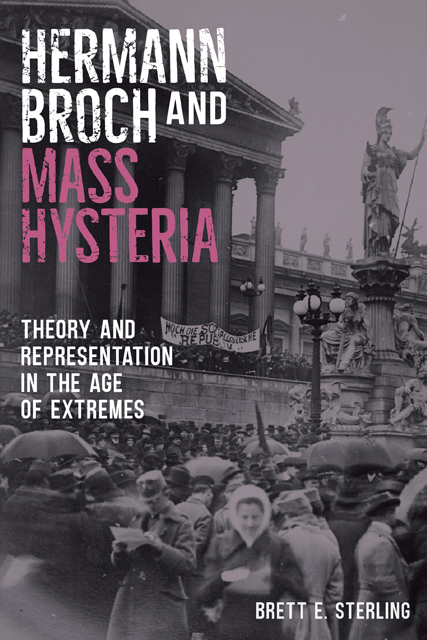Book contents
- Frontmatter
- Dedication
- Contents
- Acknowledgments
- List of Abbreviations
- Introduction
- 1: First Encounters, 1918–1929
- 2: The Power of Literature
- 3: The Mass Takes Shape: Literary Representations
- 4: Theory and Its Discontents: The Massenwahntheorie
- 5: The Threshold of Experience: Die Verzauberung
- Conclusion
- Bibliography
- Index
5: - The Threshold of Experience: Die Verzauberung
Published online by Cambridge University Press: 11 January 2023
- Frontmatter
- Dedication
- Contents
- Acknowledgments
- List of Abbreviations
- Introduction
- 1: First Encounters, 1918–1929
- 2: The Power of Literature
- 3: The Mass Takes Shape: Literary Representations
- 4: Theory and Its Discontents: The Massenwahntheorie
- 5: The Threshold of Experience: Die Verzauberung
- Conclusion
- Bibliography
- Index
Summary
In many ways, the Massenwahntheorie can be read as the culmination of Broch’s engagement with the mass. His initial dread at the political manipulability and potential violence of the mass in 1918 grew with Hitler’s seizure of power, which drove the creation of an incomplete but compelling study of mass psychology. Critically, Broch’s efforts at rebuffing the spread of fascism went beyond the diagnosis of underlying causes—mass hysteria—to a proposed cure, namely an intense program of democratic conversion. For all its insight into the psychological mechanisms that make the individual susceptible to mass hysteria, the Massenwahntheorie fails to provide a visceral connection to its subject. In order to make the interior realm of the mass accessible to the individual, theory must give way to literature. As such, Broch’s unfinished novel Die Verzauberung—started in 1935, before work on the Massenwahntheorie had begun in earnest—provides a fascinating contrast to the theoretical project. Taken together, these two intense examinations of mass hysteria provide a more holistic understanding of the phenomenon than either taken on its own. An analysis of the novel also reveals the enduring power of literature within Broch’s worldview, which persisted even after he ostensibly abandoned the literary path in favor of theory.
In chapter 3, we examined several instances of mass events depicted in Broch’s fiction. Despite the increasing prominence and detail of the mass in Broch’s successive works, it remained a figure represented—or viewed, in Die Entsühnung—from without, from the perspective of an external narrator (Esch oder die Anarchie) or of characters who remain detached from the mass event (Die Unbekannte Größe, Der Tod des Vergil). In these works, Broch’s literary representations do not solve the problem—identified by Graczyk and others—of depicting the mass from within, through the eyes of a figure who is also a part of, and a participant in the actions of the mass. In Broch’s literary works, this problem is most directly addressed in Die Verzauberung.
- Type
- Chapter
- Information
- Hermann Broch and Mass HysteriaTheory and Representation in the Age of Extremes, pp. 158 - 208Publisher: Boydell & BrewerPrint publication year: 2022



